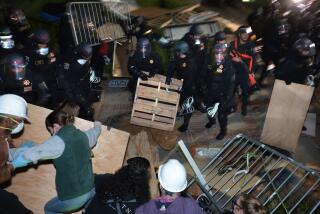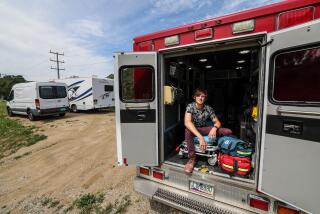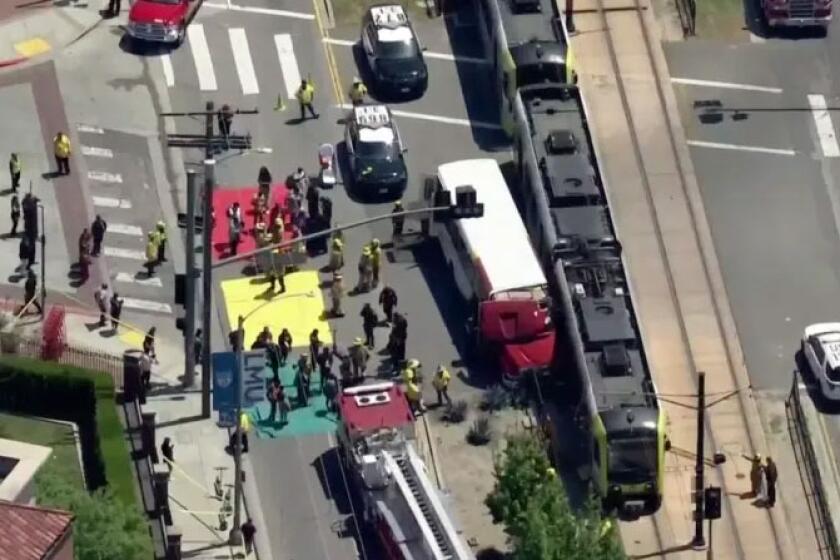D.A. Probing RTD Award of Contract on Insurance
The Los Angeles district attorney’s office confirmed Monday that it is investigating possible “irregularities” in the awarding of a major insurance claims handling contract by the Southern California Rapid Transit District.
And while officials in the district attorney’s office refused to give any details of the investigation, it was learned that the probe is focusing on allegations of possible payments to board members to influence votes on a contract awarded in 1984 to administer workers’ compensation claims.
Leonard J. Russo, owner of the firm that won the contract, and Marty Carr, a lobbyist hired by Russo to help land the job, have denied any wrongdoing, as have RTD board members, including those who played key roles in the selection.
Russo said he made no payments to gain the contract, other than consulting fees and a $5,000 bonus to Carr’s firm. “They’re free to look at anything,” Carr said. “We’ve never done anything improper.”
On their own initiation, Russo and Carr went to the district attorney’s office and were interviewed by investigators Monday.
Russo said he asked Carr “to find and contact both staff and board . . . if there were any issues or clarifications they needed to know to make a decision.”
Split the Bonus
Carr said he passed no money to board members. He said he and his former partner, Jim Kernodle, split the bonus and Carr used his share to put a new roof on his house.
Carr said that he contacted no RTD staff members but that he and Kernodle did meet or talk with some board members about the time the contract was awarded to Russo’s firm. The RTD staff had recommended another firm and ranked Russo’s firm second in the bidding.
Russo said he or Kernodle contacted three members of the RTD board committee that eventually overrode the staff decision in a closed-door session and recommended to the full board that Russo get the contract. Carr said that the RTD committee members he or Kernodle contacted included La Puente Councilman Charles Storing, Bell Councilman Jay Price and Mike Lewis, a top deputy to Los Angeles County Supervisor Pete Schabarum who is no longer on the board. All three have denied any improprieties and Storing said he does not know Carr and does not recall any such conversation.
Carr, himself a former aide to Schabarum and friend of Lewis, insisted that all he did was argue the merits of his client’s case.
One argument Carr used--and one cited by board members who overrode a staff recommendation to select another firm--was that giving the contract to Russo’s firm would save the district $205,000 if the initial two-year contract were extended to four years. The Russo firm’s bid was higher in the first two years but lower for subsequent years.
Citing the long-term savings argument, as well as Russo’s track record on another contract for administration of liability claims, Storing and Lewis pushed for Russo in the committee meeting, records show.
For a variety of reasons, including a need to correct problems attributed by RTD auditors to understaffing and increased claims for workers’ compensation, the cost of the Russo contract has increased significantly over the original estimate. The four-year cost was estimated in 1984 to be $1.4 million; this year alone the workers’ compensation program at Russo will cost the district $1.7 million, district officials said.
The district attorney’s office said it is conducting a separate investigation involving possible fraudulent liability claims handled by the Russo firm. That probe involves possible kickbacks from attorneys to some former employees of the Russo firm. RTD officials said Russo has cooperated in the investigation.
Storing acknowledged that the costs of the workers’ compensation contract have risen, but said that problem was not foreseeable in 1984.
Lewis said there was desire on the part of the RTD staff to get a new firm to administer the workers’ compensation program. He said it was generally assumed that the contract would likely be extended to four years, so Russo’s bid, with its lower long-range costs, made more sense.
Jeff Sandford, a former senior claims administrator at Russo, said he had heard--he declined to say from whom--that $5,000 was used “to influence a vote” on the contract. However, Sandford, who said he has not been interviewed by investigators, said the money may simply have been paid for lobbying work.
More to Read
Start your day right
Sign up for Essential California for news, features and recommendations from the L.A. Times and beyond in your inbox six days a week.
You may occasionally receive promotional content from the Los Angeles Times.






